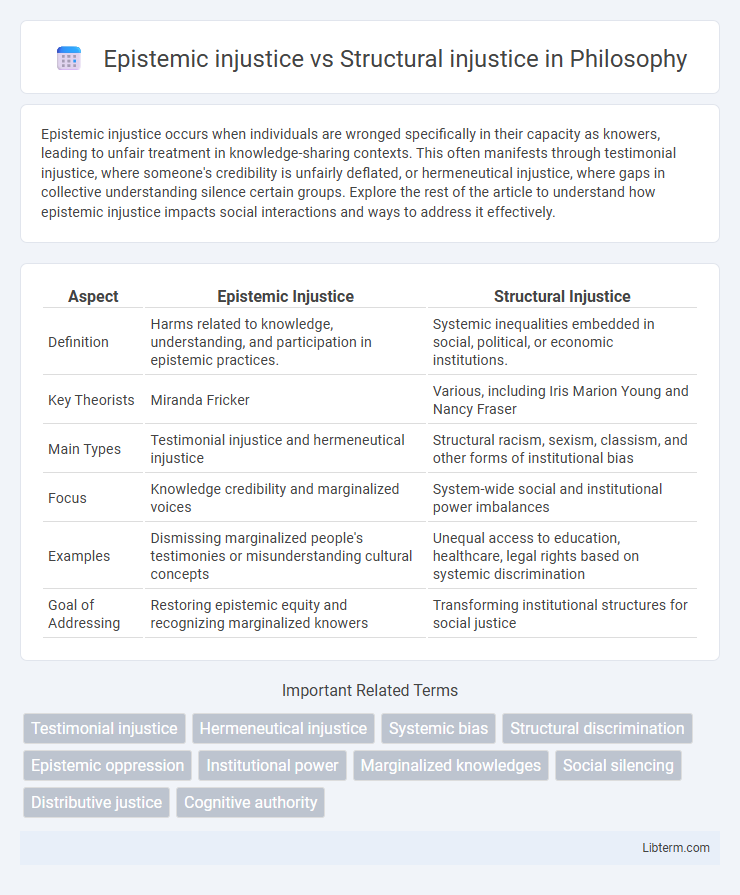Epistemic injustice occurs when individuals are wronged specifically in their capacity as knowers, leading to unfair treatment in knowledge-sharing contexts. This often manifests through testimonial injustice, where someone's credibility is unfairly deflated, or hermeneutical injustice, where gaps in collective understanding silence certain groups. Explore the rest of the article to understand how epistemic injustice impacts social interactions and ways to address it effectively.
Table of Comparison
| Aspect | Epistemic Injustice | Structural Injustice |
|---|---|---|
| Definition | Harms related to knowledge, understanding, and participation in epistemic practices. | Systemic inequalities embedded in social, political, or economic institutions. |
| Key Theorists | Miranda Fricker | Various, including Iris Marion Young and Nancy Fraser |
| Main Types | Testimonial injustice and hermeneutical injustice | Structural racism, sexism, classism, and other forms of institutional bias |
| Focus | Knowledge credibility and marginalized voices | System-wide social and institutional power imbalances |
| Examples | Dismissing marginalized people's testimonies or misunderstanding cultural concepts | Unequal access to education, healthcare, legal rights based on systemic discrimination |
| Goal of Addressing | Restoring epistemic equity and recognizing marginalized knowers | Transforming institutional structures for social justice |
Defining Epistemic Injustice
Epistemic injustice occurs when individuals are wronged specifically in their capacity as knowers, such as being unfairly discredited or silenced in knowledge-sharing contexts. It contrasts with structural injustice, which refers to systemic inequalities embedded in social institutions and practices affecting material and social conditions. Defining epistemic injustice involves identifying testimonial injustice, where someone's credibility is unjustly deflated, and hermeneutical injustice, where gaps in collective interpretive resources disadvantage certain groups.
Understanding Structural Injustice
Structural injustice refers to systemic inequalities embedded within social, economic, and political institutions that disadvantage certain groups regardless of individual intentions or actions. This form of injustice manifests through policies, practices, and cultural norms that perpetuate disparities in power, resources, and opportunities across society. Recognizing structural injustice requires analyzing the interconnected institutional frameworks that sustain oppression beyond isolated cases of discrimination or epistemic harm.
Historical Contexts and Origins
Epistemic injustice originates from marginalized groups being systematically undermined as knowers, with early formulations by Miranda Fricker rooted in social epistemology. Structural injustice refers to entrenched societal systems that produce unequal power distributions and enduring disparities, often analyzed through sociological and historical frameworks emphasizing institutional racism, classism, and patriarchy. Both concepts emerged from critical theory, with epistemic injustice focusing on knowledge and credibility, while structural injustice highlights broader socio-political mechanisms that shape historical inequities.
Key Theorists and Philosophical Foundations
Epistemic injustice, a concept extensively developed by Miranda Fricker, centers on the unfair treatment of individuals in their capacity as knowers, highlighting testimonial and hermeneutical injustices rooted in prejudices. Structural injustice, analyzed by Iris Marion Young and Nancy Fraser, addresses systemic social inequalities embedded in institutional practices and distributions of power, wealth, and opportunities. Both frameworks draw on critical social theory and feminist philosophy to interrogate how social structures shape knowledge production and perpetuate oppression.
Manifestations of Epistemic Injustice
Manifestations of epistemic injustice include testimonial injustice, where a speaker's credibility is unfairly deflated due to prejudice, and hermeneutical injustice, which arises when marginalized groups lack adequate interpretive resources to make sense of their experiences. These injustices impair knowledge production and perpetuate epistemic marginalization within social structures. Structural injustice, by contrast, refers to systemic inequalities embedded in institutions, but epistemic injustice specifically targets the processes of knowledge exchange and recognition.
Structural Factors Perpetuating Injustice
Structural injustice arises from systemic inequalities embedded in social, economic, and political institutions that perpetuate unfair treatment of marginalized groups. Key factors include discriminatory policies, unequal access to resources, and institutional biases that maintain power imbalances and restrict opportunities for equity. These structural conditions create persistent barriers that reinforce injustice across generations and social contexts.
Intersections and Divergences
Epistemic injustice occurs when individuals or groups are wronged specifically in their capacity as knowers, often through testimonial injustice or hermeneutical injustice, while structural injustice refers to systemic inequalities embedded in social, economic, and political institutions. The intersection lies in how epistemic injustice both emerges from and perpetuates structural injustice, as marginalized groups are denied credibility and interpretive resources due to broader systemic power imbalances. Divergences arise in scope and focus: epistemic injustice centers on knowledge-related harms affecting individuals' epistemic agency, whereas structural injustice encompasses wide-ranging institutional mechanisms that sustain inequality across multiple dimensions.
Social Impact and Marginalized Groups
Epistemic injustice occurs when marginalized groups are wronged specifically in their capacity as knowers, often through testimonial injustice or hermeneutical marginalization, leading to the social silencing of their lived experiences. Structural injustice refers to systemic inequalities embedded within social, economic, and political institutions that disproportionately disadvantage marginalized communities through unequal access to resources and opportunities. Both forms of injustice perpetuate social harm by limiting agency and reinforcing social hierarchies, but epistemic injustice foregrounds the erosion of marginalized voices, while structural injustice addresses the broader institutional mechanisms sustaining inequality.
Strategies for Addressing Both Forms
Addressing epistemic injustice requires strategies such as amplifying marginalized voices, promoting inclusive knowledge production, and implementing training on bias recognition in institutions. Structural injustice demands systemic policy reforms, equitable resource distribution, and dismantling discriminatory social frameworks to ensure fairness. Combining these approaches fosters comprehensive social justice by targeting both knowledge-based inequities and entrenched institutional barriers.
Future Directions in Justice Studies
Future directions in justice studies emphasize integrating epistemic injustice with structural injustice to develop comprehensive frameworks addressing both knowledge-based and systemic forms of harm. Scholars advocate for research that explores how marginalized groups' epistemic contributions are systematically devalued within institutional structures, reinforcing social inequalities. Advancing justice theories involves interdisciplinary approaches combining social epistemology, critical race theory, and intersectionality to design policies promoting equitable recognition and structural transformation.
Epistemic injustice Infographic

 libterm.com
libterm.com